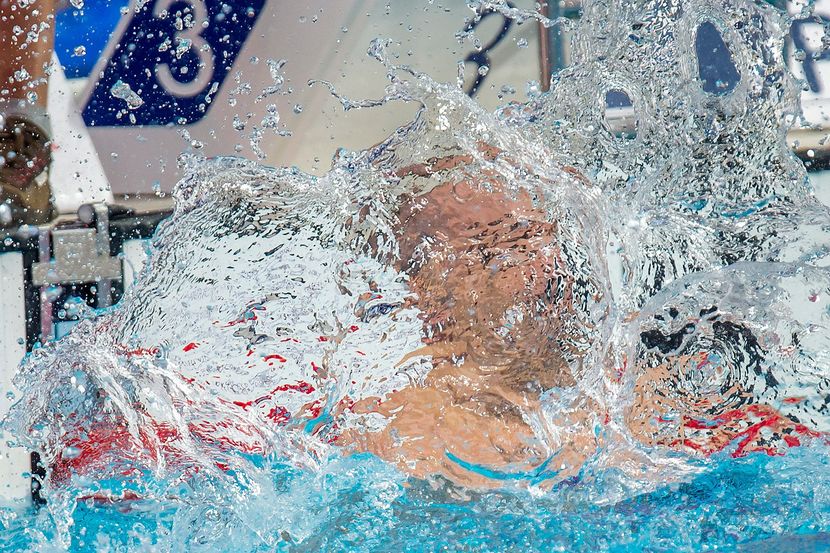
After the 10-dive heats at the Toa Payoh Swimming Complex, Bo Qiu finished first, but carried forward to the final only the third best score in terms of the dives with limited DD. Daley was only sixth in this parameter, but the difference of about 11 points left all the possibilities open for the British. But, in the decisive final, the Chinese was extremely solid and had only a minor hesitation in his last dive (an inward 3 ½ somersault, tuck position, DD 3.4), that did not receive more than 7 by the judges. Otherwise, the first four combinations were excellently performed and Qiu always oscillated between marks ranged 7.5 to 9. This made him the overall winner, with a comfortable total of 607.15. “Despite the strength of m direct competitors, this has been easy for me”, considered Qiu after his victory.
Until the third dive, Daley seemed to be in the medal’s zone, but then came a forward 3 ½ somersault (pike position) and a very deficient entry in the water. The young prodigy from Great Britain was severely penalised by the judges and his chances of medal ended on that precise instant. After a solid fourth attempt and an average last dive, Daley finished ninth, a ranking that does not match the enormous popularity that he enjoyed in Singapore. Being already a world champion, Tom Daley was surely one of the confirmed stars of the Games and his injury came certainly in the worst moment. "I tried to do my best and keep my chin up," Daley said. "Obviously, it was not good enough."
After Qiu, the silver medal went to Oleksandr Bondar, from Ukraine, who gave also an excellent impression in the preliminaries (second overall and second concerning the score of the dives with limited DD). In the final, Bondar was extremely regular, earning scores between 6.5 and 8.5 and not committing any major mistake throughout his five combinations, between DD 3.0 and 3.4. Despite his success, the difference between his overall score (565.35) and the one achieved by Qiu (607.15) must be highlighted in order to fully understand the domination and supremacy of the Chinese in this event. "I was looking for a bronze or a silver (medal) because it is very hard to compete against Qiu", declared the Ukrainian young diver.
China's Bo Qiu - credit: Xinhua-Syogoc/Guo Lei
Very interesting was the fight for the bronze medal. Until the last dive, Italy’s Giovanni Tocci seemed to be in a good position to be on the podium – he had caused very good impression in the preliminaries, when he finished fifth -, but a relatively poor last dive (a reverse 2 ½ somersault, pike position) allowed Michael Hixon (USA) to be third medallist of the day. Hixon, third of the heats, was fourth before the last attempt, and then a solid inward 2 ½ somersault, pike position (with the same DD as Tocci, 3.0) gave him the necessary advantage to earn the bronze. "Obviously, I didn't know I had medalled until the very end, so it was a real surprise for me," Hixon said.
Tocci ended up fourth, followed by Abel Ramirez Tellez (CUB, fifth), and by Germany’s Tim Pyritz, the best of the preliminaries in the dives with limited DD, but then not so “sure” with the more complicated and demanding combinations.
The men's 3m springboard podium: Hixon (USA), Qiu (CHN) and Bondar (UKR)
credit: Xinhua - Syogoc/Guo Lei
Quotes of the day
The Culture and Education Programme is an important and complementary element of these Youth Olympic Games. Throughout the several activities proposed to all the athletes competing in Singapore, they will learn the meaning of the Olympic values and principles and will get to know the secrets behind success, namely after interacting directly with great champions in sport (and in life).
Today’s selection of quotes relates to those activities (in all sports).
"We never tell the athletes that their decisions made during the game are right or wrong, we just encourage them to make the ones that benefit them. Some athletes come from countries where sport is more valued than education or vice versa, so we just want to help them find a good balance between both." - Workshop facilitator Kris Ye (SIN)
"When you lose, it's very hard. You get really down and think 'I'm a loser', but you have to learn to lose so that you can learn to win. It is turning these losses in life - when things don't go your way - into learning. Everything you do in life, it's learning. Every single moment is important. At every event, you will have something to learn from. The more competitions you do, the more you are learning about yourself. Find what makes you feel good in a competition and then keep going back to that feeling." - Olympic boardsailer Barbara Kendall (NZL)
"The surprise is that young athletes, especially the boys, keep coming back, either to play or have a chat. Who would have thought we would have teenage boys coming here [anti-doping education centre, at the Olympic Village] to hang out? Doping and doping control are often perceived as a negative thing but these young athletes are associating it with fun and it is becoming cool to be here. That's the biggest thing to come out of here." - Jennifer Sclater (CAN), education manager for WADA (World Anti-Doping Agency)
"A lot of them have a lot to say about issues they consider close to their hearts. We are trying to show them how to use interviews to raise the profile of humanitarian issues that they consider important.” - Red Cross official Puay Kiang Angela Tay (SIN)
"Our main purpose was not mainly Olympics, not even a world junior championships. It was a combination of high level sporting competition with culture and education. Athletes are participating in it and they love it. This is important for the development of sport." – Jacques Rogge, IOC President